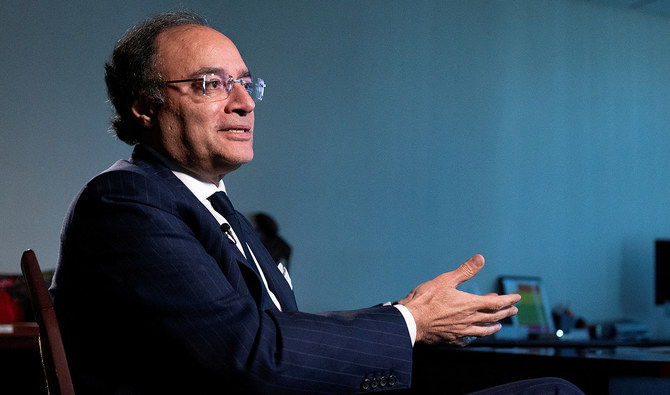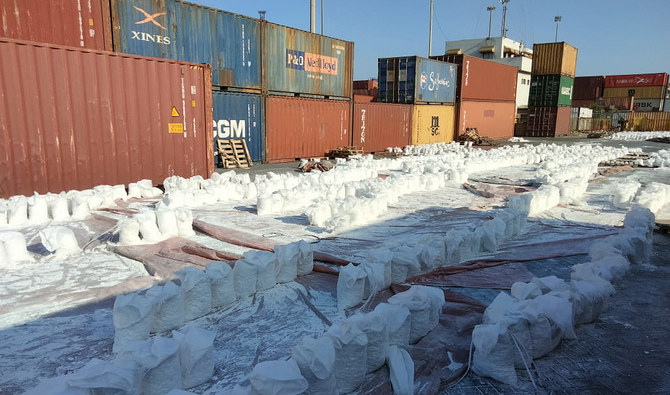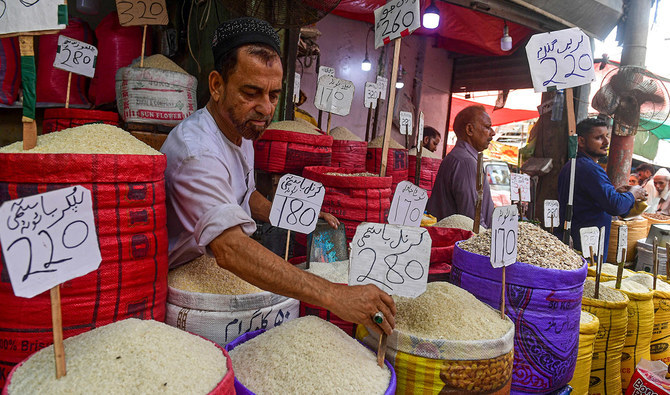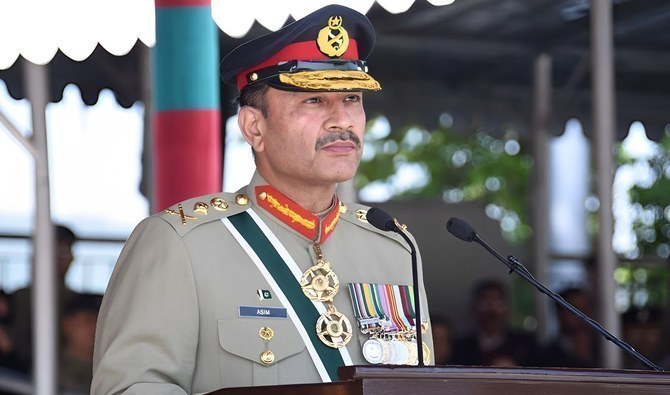WASHINGTON: Pakistan hopes to agree the contours of a new International Monetary Fund loan in May, Finance Minister Muhammad Aurangzeb told Reuters, and has kicked off talks with ratings agencies to lay the groundwork for a return to international debt markets.
The country’s current $3 billion arrangement with the fund runs out in late April and the government is seeking a longer and bigger loan to help bring permanence to macroeconomic stability as well as an umbrella under which the country can execute much needed structural reforms, the minister said.
“We expect the IMF mission to be in Islamabad around the middle of May — and that is when some of these contours will start developing,” said Aurangzeb, who met with the Fund’s Managing Director Kristalina Georgieva on Wednesday during the International Monetary Fund and World Bank Spring Meetings.
He declined to outline what size program the government hoped to secure, though Pakistan is expected to seek at least $6 billion. Aurangzeb added that once the IMF loan was agreed, Pakistan would also request additional financing from the Fund under the Resilience and Sustainability Trust.
The struggling South Asian nation had managed to accumulate foreign exchange reserves in recent months and was on track for its war chest to hit $10 billion — or roughly two months import cover — by end-June.
The debt situation also looked more benign, Aurangzeb said.
“The bulk of our bilateral debt — including our China debt — is being rolled over, so in that sense I think we are in good shape and I don’t see a big issue during this fiscal year nor next fiscal year, cause we need to repay roughly $25 billion dollars every fiscal year.”
Pakistan also hopes to come back to international capital markets, possibly with a green bond. However, there was some more work to be done before that happens, said Aurangzeb.
“We have to come back into a certain ratings environment,” he said, having kicked off talks with ratings agencies, adding the government was hoping to get an improvement in its sovereign rating in the next fiscal year.
“In all likelihood, any international capital markets issuance will likely be in the 2025/2026 fiscal year.”
Pakistan aims to agree outline of new IMF loan in May — finance minister
https://arab.news/253tt
Pakistan aims to agree outline of new IMF loan in May — finance minister

- Current $3 billion arrangement with IMF runs out in late April
- Pakistan is seeking longer and bigger loan of at least $6 billion
Google to establish fifty AI-equipped smart schools in Pakistani capital

- Smart schools incorporate technology and innovation in teaching and learning processes to improve quality of education
- Smart schools in Islamabad will be equipped with 30,000 Google for Education IDs with AI features and digital tools
ISLAMABAD: US tech giant Google is all set to establish 50 smart schools in Pakistan’s federal capital offering AI features and a suite of digital tools for “enhanced collaboration and productivity,” Pakistani state media reported this week.
A smart school incorporates technology and innovation in its teaching and learning processes to improve the quality of education. Smart schools use various technologies such as interactive whiteboards, online learning platforms, artificial intelligence and virtual reality to enhance the learning experience of students.
Experts say smart schools lead to improved student engagement and motivation, personalized learning, access to a wider range of resources, and enhanced communication between teachers, students, and parents. Smart schools also promote collaborative learning, critical thinking, and problem-solving skills among students.
A Google for Education team and its local partner Tech Valley met this week with the Secretary of the Ministry of Federal Education and Professional Training to present its proposals for Pakistan’s education sector, including setting up smart schools.
“50 Smart schools in Islamabad will be equipped with 30,000 Google for Education IDs which includes features, powered by AI, like practice sets and a suite of digital tools for enhanced collaboration and productivity,” the APP wire agency reported.
“Discussions extended to several upcoming initiatives, including teacher workshops on Google for Education tools, the establishment of a public Google Reference School, the training of 2,000 youths in job-ready skills through Google Career Certificates, and the potential collaboration on hosting an Edutech event with the Ministry of Federal Education in Pakistan.”
According to the “Global Education 2020” report issued by UNESCO, there has been a significant increase in the use of technology in education worldwide. The report indicated that 90 percent of the world’s countries have launched initiatives to integrate technology into education, and 80 percent of students in advanced countries use technology in education.
As per a report by “Holistics,” a business intelligence and data analytics platform, Smart School technology has also been adopted by many countries in Asia, including Singapore, China, and South Korea, and has proven to be effective in improving the quality of education and learning outcomes.
The size of the Smart School market is expected to reach $73.8 billion by 2025 compared to a market size of $43.6 billion in 2018, marketing research company “Markets and Markets” said in a recent report.
Pakistan inflation eases to 22-month low at 17.3% in April amid monetary tightening

- Pakistan beset by inflation above 20% since May 2022, registering high of 38% in May 2023 due to high food, energy costs
- Pakistan is currently navigating strict reforms as part of an International Monetary Fund bailout program
KARACHI: Pakistan’s inflation eased off to 17.3%, the lowest since May 2022, on a year-on-year basis in April 2024 from 20.7% recorded in March 2024 and 36.4% in April 2023, official data issued on Thursday said.
Pakistan has been beset by inflation above 20% since May 2022, registering a high of 38 percent in May 2023 main due to high food and energy costs.
Pakistan’s central bank, which has kept the interest rate steady at 22% since June last year amid tight monetary tightening, had forecasted that ” inflation will continue to remain on downward trajectory further moderation.”
“Besides the coordinated tight monetary and fiscal policy response, other factors that have led to this favorable outcome include lower global commodity prices, improved food supplies and high base effect,” the central bank said in its monetary policy statement issued on Monday.
On a month-on-month basis, inflation decreased to 0.4 percent in April 2024 as compared to an increase of 1.7% in the previous month and a hike of 2.4% in April 2023, according to the Pakistan Bureau of Statistics (PBS) .
In April on an annual basis the prices of onions increased by 156.16 percent, tomatoes 126.67 percent, chicken 33.62 percent and meat 22.18 percent. In the non-food category, gas charges surged by 318.74 percent, electricity charges 71.12 percent, accommodation services 31.50 percent, transport services 26.70 percent, cotton cloth 23.00 percent, drugs and medicines 22.78%, and footwears 21.38%.
Urban core inflation measured by non-food non-energy items increased to 13.1 percent on an annual basis in April 2024 as compared to an increase of 12.8 percent in the previous month and 19.5 percent in April 2023.
Rural core inflation measured by non-food non-energy items increased to 19.3 percent on a year-on-year basis in April 2024 as compared to an increase of 20 percent in the previous month and 24.9 percent in April 2023.
Pakistan’s drug enforcement agency nets record ‘ice’ haul in major anti-trafficking operation

- The Anti-Narcotics Force seizes 224 kilograms of the substance while it was being transported to Belgium
- The authorities also apprehended three suspects, among them two Afghan nationals, who were trying to escape
ISLAMABAD: Pakistan’s Anti-Narcotics Force (ANF) announced on Thursday it had achieved a “monumental victory” in the ongoing battle against drug trafficking by intercepting the largest consignment of methamphetamine, popularly called “ice,” in the nation’s history.
Methamphetamine, known for its potent and addictive properties, has seen a significant rise in use not just in Pakistan but globally, contributing to a burgeoning health crisis.
The drug’s accessibility and escalating abuse have heightened law enforcement and public health efforts to curtail its spread.
This major seizure highlights the ongoing challenges and the critical need for continued vigilance and international cooperation in combating drug trafficking and its societal impacts.
“A total of 224 kilograms of Methamphetamine (Ice) was seized by the diligent ANF team at the Karachi port,” an official statement announced. “Disguised within five containers labelled as ‘Soapstone’ exports from Afghanistan to Belgium, this illicit substance was artfully concealed within the container’s roof and doors.”
The authorities also apprehended three suspects involved in the smuggling attempt, among them two Afghan nationals.
“The suspects were attempting to flee to Afghanistan via the Torkham border when they were intercepted by ANF Team,” the statement continued.
It added the intercepting the massive methamphetamine consignment by ANF prevented its distribution and potential harm to countless people.
Pakistan’s inflation sees lowest increase in nearly two years at 17.3% in April

- Pakistan has been beset by inflation above 20% since May 2022, registering a high of 38% in May 2023
- Month on month inflation was down 0.4%, showing negative growth for the first time since last year in June
KARACHI: Pakistan’s Consumer Price Index (CPI) for April rose 17.3% from a year earlier, data from the Pakistan Bureau of Statistics showed on Thursday, the lowest reading in nearly two years and below the finance ministry’s projections for the month.
Pakistan has been beset by inflation above 20% since May 2022, registering a high of 38% in May 2023, as it has navigated reforms as part of an International Monetary Fund (IMF) bailout programme.
Month on month inflation was down 0.4%, showing negative growth for the first time since June 2023.
The Finance Ministry in its monthly economic report said it expected inflation to hover between 18.5% and 19.5% in April and ease further in May to 17.5%-18.5%.
Pakistan’s central bank kept its key interest rate unchanged at 22% for the seventh straight policy meeting on Monday, hours before the IMF executive board approved $1.1 billion in funding under a $3 billion standby arrangement signed last year.
The bank’s monetary policy committee said in a statement it was “prudent” to continue with its monetary policy stance at this stage to bring inflation down to the target range.
‘Well aware of our constitutional limits,’ Pakistan’s army chief declares at PAF graduation parade

- General Asim Munir says Article 19 of Pakistan’s constitution sets limits on freedom of expression
- He says a strong air force is essential to prevent Pakistan from being at the mercy of aggressors
ISLAMABAD: Pakistan’s army chief General Asim Munir emphasized the armed forces’ awareness of their constitutional limits and expectations for legal compliance from others while addressing the graduation parade at the Pakistan Air Force (PAF) Academy in Risalpur on Thursday.
The military’s involvement in politics has been a contentious issue in Pakistan, with public criticism intensifying since the ouster of former prime minister Imran Khan in a no-confidence vote in April 2022.
The country’s military has publicly denied intentions to interfere in political affairs more recently, asserting a commitment to uphold democracy and remain apolitical, amid growing public scrutiny over its past involvements in political matters.
“We are well aware of our constitutional limits and expect others to prioritize adherence to the constitution as well,” the army chief was quoted as saying by the military media wing, ISPR, in a statement.
He said in his address to the graduating cadets that Article 19 of the Pakistani constitution set limits on freedom of expression as well.
“Those who openly violate the clear restrictions on freedom of expression set by the constitution cannot point fingers at others,” he asserted.
General Munir noted specific technologies, including artificial intelligence, robotics and quantum computing, were expanding the scope and transforming the use of air power.
However, he warned against an arms race in the region, saying it could disrupt the balance of power in and around South Asia.
The army chief pointed out that a strong air force was essential to prevent the country from being at the mercy of external aggressors.
“The recent war in Gaza is a fresh example of the miseries that wars can bring,” he said. “The indiscriminate killing of elderly, women and children in Gaza is proof that violence is increasing in the world.”
He also criticized India for its policies in the dispute Kashmir region, pointing out it would not be able to suppress the “voices of freedom” and promising continued Pakistani support on moral, political and diplomatic levels for those resisting New Delhi’s rule.










